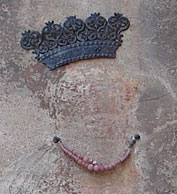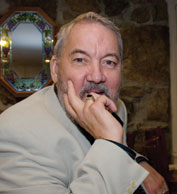STILLPOINT Archive: last updated 04/16/2008
On Learning and Humility
Michael W. Givens
Our collective gaze should be on those things that help us grow in the Lord and on those things that help us sharpen our God-given gift of critical intelligence. But those targets may seem vague to us and therefore difficult to fixate on. As an academic institution, we are about faith and integration: we acknowledge that truth has its origin in God; that reason exercised in a framework of a faith commitment to God will nurture our faith and expand our knowledge. For us, faith and learning are inseparable. If that's true, my question has always been "What is it that holds them together?" What's the glue, so to speak? Most of us have struggled with faith-learning integration questions. But in the course of your studies and search for Truth, if you should find yourself at a place of humility, you will know that you have been on the right path. It is humility that will bind together our faith and our learning and make them inseparable.
From a convocation address. Michael W. Givens, Ph.D., professor of kinesiology, will retire at the end of this academic year after 29 years at Gordon.
Howard Receives Lilly Award
Tal Howard's book Protestant Theology and the Making of the Modern German University won the Lilly Fellows Program Annual Book Award, which recognizes an original, imaginative work of scholarship exploring the intersection of religion and higher education. Professor Howard's book has been reviewed in the Times Higher Education Supplement, Frankfurter Allgemeine Zeitung and the American Historical Review. He has been invited to give talks on the book at Oxford University and the Humboldt University of Berlin.
Palimpsest/Palinsesto Debuts Online
John Skillen
Palimpsest/Palinsesto, an online journal associated with the Studio for Art, Faith and History, is now available on the Gordon website. The Studio, located in the historic central-Italian town of Orvieto, oversees the Gordon in Orvieto program which focuses on arts and humanities, and is administered by Gordon's Global Education Office. It sponsors new work in the visual and performing arts, and hosts conferences, retreats and workshops, often in partnership with other civic, cultural and faith-based organizations, both local and international. The goal of the Studio is to foster a living tradition of art and faith, serving as a work site of new art that manifests a vital encounter with the past expressed in idioms that speak to the present. Palimpsest/Palinsesto will appear three times a year and will feature essays, poetry and visual work associated with the Studio and with the Gordon in Orvieto program.
Palimpsest is the technical word for an ancient or medieval manuscript on which earlier writing was scraped off the animal-skin pages in order to reuse the vellum for another text. But often the earlier writing can still be deciphered, shadow-like, beneath the more recent over-writing. In fact, several ancient texts have been preserved only through their under-written traces in a palimpsest. Hence the erasure of earlier writing represents both destruction and a mode of survival.
In Italian, the word palinsesto is commonly used with the wider sense of any sort of historical layering in which older stages still peer through later changes or renovations, leaving fragmentary tracks, traces and echoes--as in the architecture of towns such as Orvieto, where the outlines of medieval window frames may still be visible in buildings remodeled in Renaissance styles. Palimpsests can offer tantalizing clues and inspiration for people wishing to reconnect with a tradition that has decayed or become fragmented.
The first issue of Palimpsest/Palinsesto will include essays by Mark Sargent, John Skillen, Bruce Herman, Tanja Butler and Susanna Tamaro, and poetry by Scott Cairns, Christine Perrin and Andrew Frisardi.
John Skillen is the director of the Gordon in Orvieto program.
Read More... Palimpsest/Palinsesto
Creative Director Wins Design Competition
Tim Ferguson Sauder, creative director and part-time faculty member at Gordon, won first place at the Boston Cut&Paste Digital Design Tournament in September, a tournament that travels nationally and internationally. Sauder competed against seven other designers from around the nation.
"We were given 15 minutes to create and design something based on themes provided to us a week before the tournament," said Sauder. "Anything we incorporated into our designs needed to be photographed right there on stage within the 15-minute time frame, in front of a packed audience." The competition was also streamed live on the Cut&Paste website so friends, family and others could watch.
A Sabbatical of Giving
Suzanne Phillips, professor of psychology, recently returned from a sabbatical volunteering at Pioneer House, a clubhouse in Peabody, Massachusetts. Clubhouses are community-based vocational rehabilitation centers for adults with mental-health issues. Members and staff work together, helping members gain confidence in their work skills.
Phillips' sabbatical goal was to learn more about community-oriented perspectives on mental health and mental disorders. She worked with members to gather and organize information about the clubhouse's history for its 20th anniversary next summer, interviewing past and present members, scanning photographs and researching archived newsletters. "I came to appreciate how clubhouses provide opportunities for people with mental health concerns to participate actively in a meaningful community setting," said Phillips.
The Inimitable Peter W. Stine
When he started at Gordon, English professor Peter W. Stine had two kidneys, two legs and a great sense of humor. But now, on his way out, he's "given both of his legs to Gordon," according to fellow professor Mark Stevick--and replaced a kidney. His sense of humor, however, has remained steady.
Pictures of students, masks from sabbatical trips, Princemere Readers tour posters, and shelves and shelves of books have cluttered Dr. Stine's office for his 40 years at Gordon. But at the end of this academic year, when he retires, he will take these things with him, move to Brooksby Village in nearby Peabody, Massachusetts, preach and travel, and maybe even find time to read the complete works of Thomas Hardy.
Stine has left a mark on campus, teaching British, African and Nobel-Prize literature classes. He paved the way for British-literature studies to be part of the European seminar, starting in 1973. His reading of The Best Christmas Pageant Ever became a tradition on campus, and he often performed in NODROG, a faculty talent show where one year he removed his prosthetic leg for entertainment. He will lead his last literary pilgrimage to Britain this July, taking students on a "Castles, Cathedrals and Poetic Places" tour throughout Britain.
Students have always loved this curmudgeonly but caring professor, who called them by their last names and never let them wear hats in class. "Welcome to college!" he was known to retort to students complaining of heavy work loads. He has also left an indelible impression on faculty and staff. Sue Hakes of the Alumni and Parent Relations staff, whose family had a deep friendship with the Stines, gave him one of her kidneys when he needed one. "Thank you, Peter W., for your invaluable contributions to the Department of English Language and Literature--and for being a good friend to so many of us," fellow English professor Janis Flint-Ferguson says.
Stine's advice as he departs: "Always be students, always read and always be curious. It's a large world God has made, and you should always be curious about what's in it."
Contact Peter W. Stine:
peter.stine gordon.edu
gordon.edu
8 Larrabee Avenue, Danvers MA 01923


